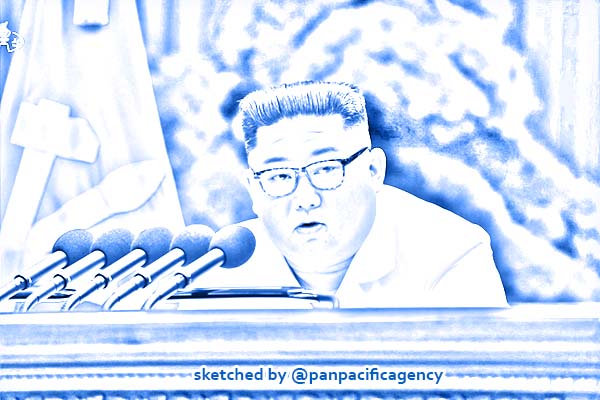Kim Jong-un signal for help could mark a turning point in Covid fight

North Korean leader Kim Jong-un is seen speaking at the party`s plenary meeting on Sunday in an image released by the Korean Central News Agency. Yonhap. Sketched by the Pan Pacific Agency.
SEOUL, Jul 1, 2021, The Guardian. Almost 18 months after the start of the Covid-19 pandemic, North Korea has come close to conceding that its attempts to keep the virus from its borders have failed. While North Korea’s state-controlled media have not reported any cases, some analysts assume the virus has breached the country’s defences, prompting its leader, Kim Jong-un, to issue a coded request for outside help this week, The Guardian reported.
If their interpretation is correct, it would mark a significant turning point in the North’s coronavirus response, after repeated claims by the regime that it has not recorded a single infection.
North Korea’s proximity to China – the source of the outbreak – prompted it to take swift action early last year.
In what it called a fight for “national existence”, it severely curtailed cross-border traffic and trade, and banned international arrivals and sent diplomats and aid workers home. North Korean citizens already accustomed to restrictions on their freedom of movement have been subject to even tighter controls on domestic travel.
North Korea has told the World Health Organization it has not found a single coronavirus infection after testing more than 30,000 people.
The US and South Korea are among those to have cast doubt on the North’s reported success in escaping a virus that has breached national borders in the rest of the world. When South Korea’s then foreign minister, Kang Kyung-wha, questioned its neighbour’s claims last December, Kim’s influential sister, Kim Yo-jong, told Kang she would “pay dearly” for her “reckless” remarks.
But on Tuesday, her visibly angry brother referred to “failed” pandemic measures and a “great crisis” in its efforts to control the pandemic. According to the state-run KCNA news agency, Kim berated, and sacked, senior officials for neglecting “important decisions of the party … as required by the prolonged state emergency epidemic prevention campaign”.
This, he told a meeting of the ruling party’s politburo, had created “a great crisis in ensuring the security of the state and safety of the people and entailed grave consequences”. He did not give details of what had happened, however.
For some analysts, Kim’s outburst was tantamount to an admission that the virus had taken hold in North Korea, whose health infrastructure is ill-equipped to handle a public health crisis.
“There is no possibility that North Korea will ever admit to an infection,” said Hong Min, a senior analyst at Seoul’s Korea Institute for National Unification. “Even if there have been mass transmissions, the North will definitely not reveal such developments and will continue to push forward its anti-virus campaign.
“But it is also clear that something significant happened, and it was big enough to warrant a reprimanding of senior officials. This could mean mass infections or some sort of situation where a lot of people were put at direct risk of infections.”
Du Hyeogn Cha, an analyst at the Asan Institute for Policy Studies in Seoul, believes the North could be dealing with a huge Covid-19 outbreak that has spread beyond border towns and rural areas to cities, possibly including the capital Pyongyang.
But other experts say there are, as yet, no definitive signs that the North is battling an outbreak.
Park Won-gon, a professor of North Korea studies at Ewha University, said he doubted that this week’s politburo meeting, which was attended by party officials from across the country, would have gone ahead in the midst of an aggressive outbreak.
In addition, a significant rise in Covid-19 cases would force the regime to take immediate action to seal off affected regions, but groups that monitor North Korea have seen no evidence of that, according to Ahn Kyung-su, the head of the Research Center of DPRK Health and Welfare in Seoul.
Given that the North Korean regime is unlikely to publicly acknowledge an outbreak, some believe Kim’s tirade was an indirect appeal for help from the outside world.
This month, Pyongyang admitted it was tackling a serious food crisis caused by a dramatic slump in trade with neighbouring China, natural disasters and international sanctions targeting its nuclear weapons programme. In April, Kim warned North Koreans to prepare for the “worst-ever situation”.
There is even speculation that Kim’s visible weight loss is an attempt to demonstrate his devotion to public duty amid food shortages and shore up support. Last week, state television showed an unidentified Pyongyang resident describing how “heartbroken” people were over their leader’s “emaciated” appearance.
China – North Korea’s biggest trade partner and aid donor – appears ready to step in and help its neighbour, possibly including the provision of vaccines.
“China and [North Korea] have a long tradition of helping each other when they encounter difficulties,” Wang Wenbin, a Chinese foreign ministry spokesperson, told reporters this week. “If necessary, China will actively consider providing assistance.”
Covax, the global vaccine-sharing initiative, said in February that the North could receive 1.9m doses in the first half of the year, but delivery has been delayed due to global shortages.